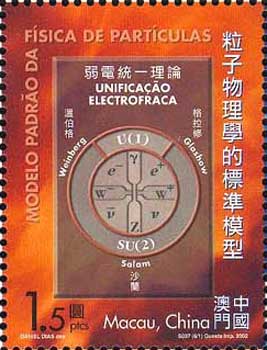Dr. Abdus Salam (Urdu: عبد السلام) (January 29, 1926 at Santokdas, Sahiwal in Punjab 21 November 1996 in Oxford, England) was a Pakistani theoretical physicist who received the Nobel Prize in Physics in 1979 for his work in electroweak theory which is the mathematical and conceptual synthesis of the electromagnetic and weak interactions, the latest stage in the effort to provide a unified description of the four fundamental forces of nature. Salam, Sheldon Glashow and Steven Weinberg arrived at the theory independently and shared the prize. The validity of the theory was ascertained through experiments carried out at the Super Proton Synchrotron facility at CERN in Geneva, particularly through the discovery of the W and Z bosons.
Abdus Salam was an exceptional student in high school. According to his Nobel Prize biography, When he cycled home from Lahore, at the age of 14, after gaining the highest marks ever recorded for the Matriculation Examination at the University of the Punjab, the whole town [Jhang] 1 turned out to welcome him. His first paper was written as a student there in 1943 and concerned Srinivasa Aiyangar Ramanujan.[1]
He was awarded an MA from Government College, Lahore, in 1946 then gained a scholarship to St. John's College, Cambridge , where he took a BA, graduating with with First class honours in mathematics and physics in 1949. In 1950 he won the Smith's Prize St John's College. His a PhD in theoretical physics from Cambridge was awarded in 1951 and contained fundamental work on quantum electrodynamics which had already gained him an international reputation, for which he was also awarded the Adam's Prize.
He returned to Government College, Lahore as a professor of mathematics in 1951-54 and then went back to Cambridge as a lecturer in mathematics.
During the early 1960s Salam played a very significant role in starting Pakistan's Atomic Energy Commission and Suparco, the country's space agency. Founder and Director of the International Centre for Theoretical Physics (ICTP), Trieste, Italy from 1964 to December 1993, Salam was a firm believer that "scientific thought is the common heritage of mankind", and that developing nations needed to help themselves and invest into their own scientists to boost development and fill the gap between the rich North and the poor South of the planet, thus contributing to a more peaceful world. Salam also founded the Third World Academy of Sciences (TWAS) and was instrumental in the creation of a number of international centres dedicated to the advancement of science and technology.
In 1956 he was invited to take a chair at Imperial College, London, where he and Paul Matthews created a lively theoretical physics group. He remained a professor at Imperial until his retirement. In 1964, he founded the International Centre for Theoretical Physics, Trieste in Northeastern Italy. In 1959, he became the youngest Fellow of the Royal Society (at that time) at the age of 33.
Salam died at 70 in Oxford in 1996, after a long illness. He was buried (without any official protocol) in Rabwah, Pakistan.
Professor Salam was a devout Muslim who belonged to the Ahmadiyya Community, and therefore he was never sufficiently recognized by the Pakistani government for being the country's first and only Nobel Laureate. In 1998, the government issued a stamp with his picture, but only as part of the series of stamps "Scientists of Pakistan" and without any special dedication to him. [2]

Speech at Nobel Prize Banquet
During his acceptance speech for the Nobel Prize in Physics, Salam famously quoted the following verses from the Quran
"Thou seest not, in the creation of the All-merciful any imperfection, Return thy gaze, seest thou any fissure. Then Return thy gaze, again and again. Thy gaze, Comes back to thee dazzled, aweary."
He then proceeded to say: "This in effect is, the faith of all physicists; the deeper we seek, the more is our wonder excited, the more is the dazzlement for our gaze." [1]
Links
Biographies of Physicists and Astronomers
Retrieved from "http://en.wikipedia.org/"
All text is available under the terms of the GNU Free Documentation License

